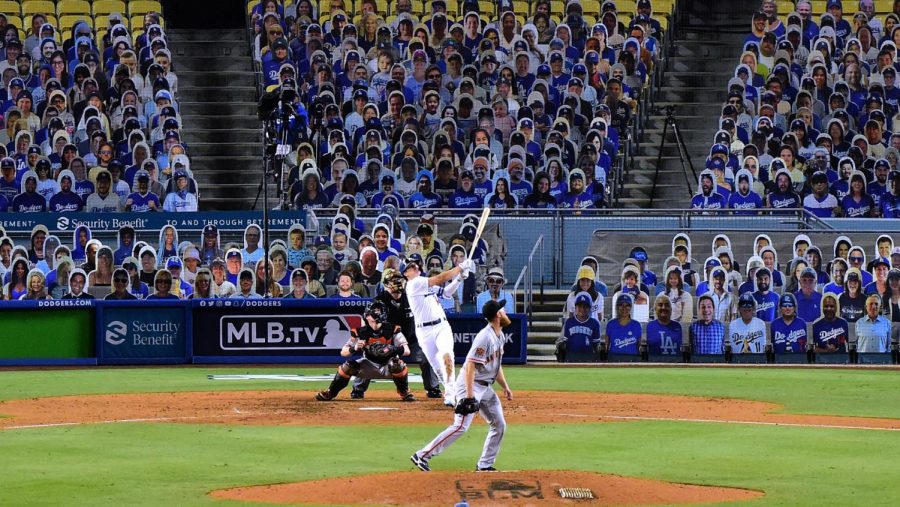MLB Update
Courtesy of Harry How/Getty Images
Stadiums have yet to be open to in-person attendance. In an attempt to make the fans feel closer to the players during the pandemic, the Los Angeles Dodgers have taken to selling cardboard cutouts of fans and their pets to be placed in the stands.
September 30, 2020
Crack! It’s a clean hit on the wooden barrel of the bat and the ball sails high through the air. The cameras train onto the baseball streaking through the air and follow its trajectory until it disappears over the fence. The fans cheer, the celebratory music blares through the speakers, and the batter jogs through the bases to rejoin his teammates at home plate — this is the magical scene of a home run in Major League Baseball.
With so many baseball fans craving for the return of competitive baseball during the pandemic, Major League Baseball has been determined not to disappoint. Though the 2020 MLB season has been shortened due to COVID-19, the regular-season games started on July 23 and MLB officials announced that teams would each play 60 games this season (instead of 162 games). As of September 15, teams within both the American League and the National League have each played nearly 47 games. In particular, this modified season has also brought forth changes to the Major League Baseball playoffs, the post-season tournament that determines the participants and winner of the World Series.
To compensate for the shorter regular season, the post-season will have more games, featuring 16 playoff teams (8 from each league) in place of the traditional 10-team post-season. Rather than the traditional “sudden-death” Wild Card Series, Wild Card games — matches between the playoff teams that did not top their division — will be conducted in a best-of-three format. Division winners will have the opportunity to rest their teams during the Wild Card games as the playoff teams battle to qualify for the subsequent Division Series.
The rest remains unchanged. The Division Series follows its traditional best-of-five format and the subsequent League Championship Series maintains its best-of-seven format. After the teams have been whittled down, the World Series finalists will be greeted with the usual World Series design, and a best-of-seven clash determines the League Champion of this special year.
But isn’t there a pandemic in the United States right now? That’s right, and the return of top-flight baseball will see the proper safety precautions put into place to avoid heightening risks. According to USA Today, nearly 40 players and staff members tested positive for the coronavirus in the week of June 14. The results generated an atmosphere of panic within the MLB, as the players and staff that tested positive had attended the MLB spring training and participated within the facilities. The risk of further transmission of the virus led to the MLB shutting down such facilities for them to undergo cleaning and sanitization. Players were also required to test negative before they could return to training.
The shortened, 60-game regular season is also a direct effect of the pandemic. By drastically reducing the number of games played, travel and meetings between different teams are consequently reduced as well, lowering the chances for players and staff to contract the virus. However, there are still some doubts among the fans of this effectiveness. Leah Jennings (10), an avid Major League Baseball viewer, says that the shortened season may be unnecessary because “they are still playing games anyway” and the players will have already been exposed to potential risks of COVID-19 through matches. “Reducing the number of games doesn’t really do anything except shorten their playing time,” says Leah.
Furthermore, as stated by CBS Sports, the MLB has yet to allow fans into the stadiums, another step taken to reduce infection rates. Major League Baseball remains strict on this protocol, although some teams have chafed against current rules prohibiting fans in the stands, as no attendance means a heavy loss of income from tickets and other services. However, with infection rates on the rise and the postseason beckoning just two weeks away, there will likely be little movement by MLB officials to enact significant changes.
To the delight of baseball fans throughout the United States and Yorba Linda, Major League Baseball’s season will not be canceled, albeit closed to fan attendance. With a reduced number of games and an expanded roster of playoff participants, this pandemic season of top-flight baseball will see unpredictability brought to the competition home plate.





































